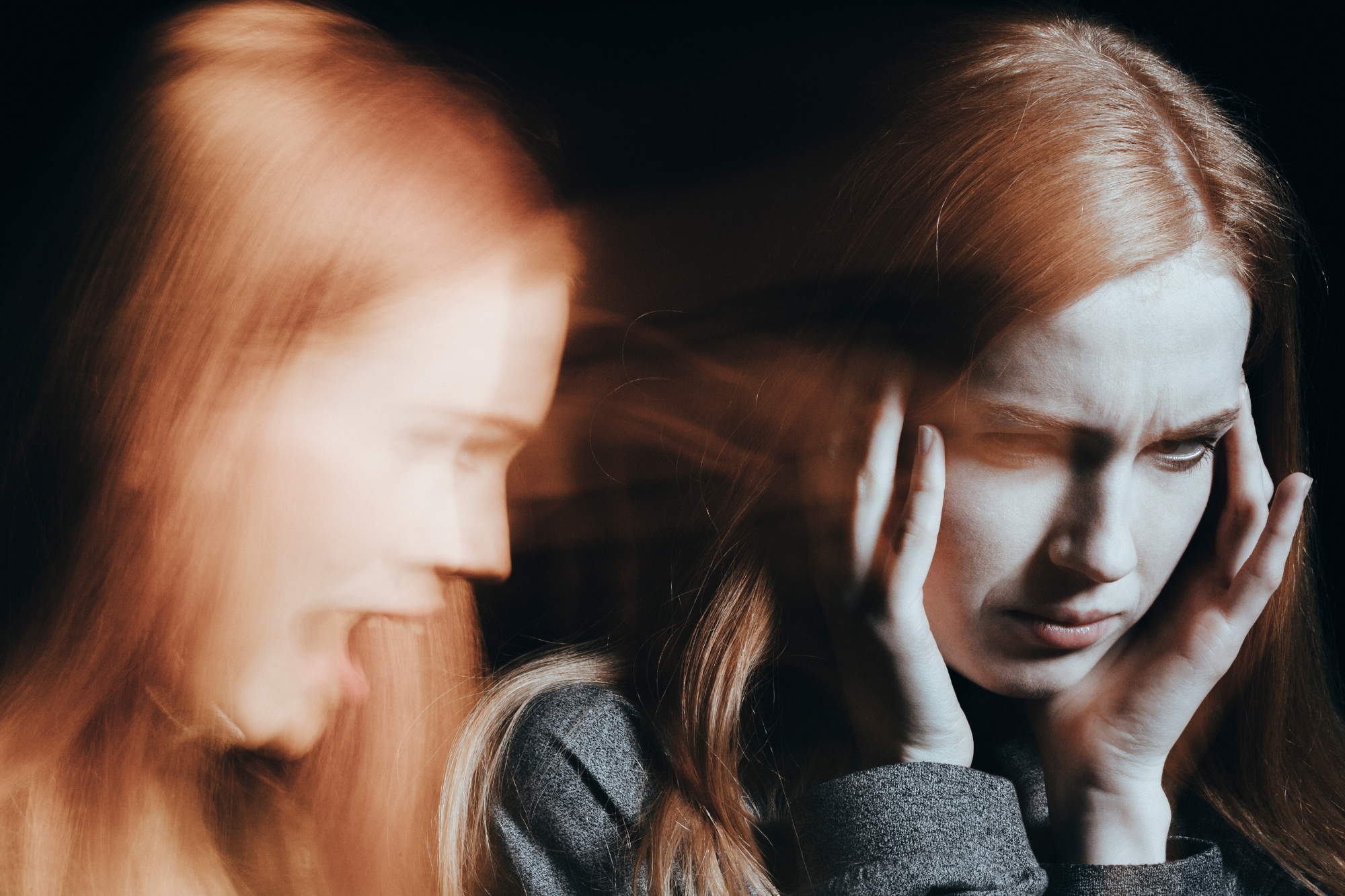Bipolar disorder and schizophrenia are both serious mental disorders that can significantly impact an individual’s life. While they may have a few similarities, they are distinct conditions with different symptoms and treatment approaches. Understanding the differences between these two disorders can be crucial for proper diagnosis and management.
Bipolar Disorder: A Mood Disorder
Bipolar disorder is primarily a mood disorder characterized by extreme mood swings that include emotional highs (manic episodes) and lows (depressive episodes). People with bipolar disorder experience mood disorder symptoms that can range from periods of intense energy and euphoria during manic episodes to profound sadness and hopelessness during depressive episodes. There are different types of bipolar disorder, including Bipolar I, which involves severe manic episodes, and Bipolar II, which involves less intense hypomanic episodes paired with depressive episodes.
Key Symptoms of Bipolar Disorder:
Manic Episodes: Elevated mood, increased energy, reduced need for sleep, impulsive behavior.
Depressive Episodes: Feelings of sadness, fatigue, loss of interest in activities, and suicidal thoughts.
Mood Disorder Symptoms: Rapid mood swings, irritability, and difficulty maintaining relationships.
Schizophrenia: A Psychotic Disorder
Schizophrenia, on the other hand, is a psychotic disorder that primarily affects a person’s ability to think clearly, manage emotions, and interact with others. Schizophrenia symptoms can include hallucinations, delusions, disorganized thinking, and impaired functioning. Unlike bipolar disorder, schizophrenia does not involve the extreme mood swings seen in mood disorders, though it may be accompanied by mood disturbances in a related condition known as schizoaffective disorder.
Key Symptoms of Schizophrenia:
Psychotic Symptoms: Hallucinations (hearing or seeing things that aren’t there), delusions (false beliefs), and disorganized speech.
Negative Symptoms: Reduced ability to function normally, such as lack of motivation, social withdrawal, and flat affect.
Cognitive Symptoms: Problems with memory, attention, and decision-making.
Schizoaffective Disorder: A Hybrid Condition
Schizoaffective disorder is a complex mental health condition that combines symptoms of both schizophrenia and bipolar disorder. Individuals with schizoaffective disorder experience psychotic symptoms, such as hallucinations or delusions, alongside mood disorder symptoms, like those seen in bipolar disorder. Because it includes elements of both conditions, schizoaffective disorder can be particularly challenging to diagnose and treat.
Schizophrenia vs. Bipolar Disorder: Key Differences
When comparing schizophrenia vs. bipolar disorder, the most significant difference lies in the nature of the symptoms. While bipolar disorder is marked by mood disorder symptoms, schizophrenia is defined by psychotic symptoms and cognitive impairments. Both conditions require different approaches to treatment and management, though both can be debilitating if not properly treated.
Mood Swings vs. Psychosis: Bipolar disorder involves mood swings between mania and depression, whereas schizophrenia involves psychosis without the characteristic mood swings of bipolar disorder.
Negative Symptoms: Schizophrenia often includes negative symptoms, such as reduced emotional expression, which are not typically seen in bipolar disorder.
Treatment Approaches: Managing symptoms of bipolar disorder usually involves mood stabilizers and therapy, while treating schizophrenia often focuses on antipsychotic medications and interventions aimed at improving cognitive function.

Understanding the Onset and Progression of Bipolar Disorder vs. Schizophrenia
Just as bipolar vs schizophrenia symptoms differ, the onset and progression of bipolar disorder and schizophrenia can also vary significantly. Bipolar disorder often begins with noticeable mood changes, such as episodes of depression or hypomania, which gradually become more extreme over time. In contrast, schizophrenia may manifest with subtle cognitive or social difficulties before progressing to more severe symptoms like hallucinations or delusions. Recognizing early signs of both bipolar and schizophrenia is crucial, as early intervention can improve long-term outcomes.
Genetic and Environmental Risk Factors of Bipolar Disorder vs Schizophrenia
Both conditions have genetic and environmental risk factors that contribute to their development. Key factors include:
- Genetic: A family history of bipolar disorder or schizophrenia increases the risk of developing these conditions.
- Environmental:
- Childhood trauma or abuse
- High levels of stress
- Prenatal exposure to infections or malnutrition
- Use of drugs or alcohol during adolescence
The interaction between genetic predisposition and environmental influences is still an area of active research.
Impact on Daily Functioning and Quality of Life
Living with bipolar disorder or schizophrenia can profoundly affect daily functioning and quality of life. Challenges may include:
- Bipolar Disorder:
- Difficulty maintaining employment due to unpredictable mood swings
- Struggles with sustaining healthy relationships
- Disruptions to daily routines and responsibilities
- Schizophrenia:
- Impaired ability to engage in meaningful activities
- Cognitive and social challenges that hinder independence
- Negative symptoms like social withdrawal and lack of motivation
Both conditions also carry a risk of social stigma, which can further complicate access to support and services.
Differences in Brain Structure and Function in Bipolar Disorder vs. Schizophrenia
Research shows that both conditions involve unique brain abnormalities. For example, people with bipolar disorder often exhibit variations in areas that regulate mood and emotions, like the prefrontal cortex. In schizophrenia, structural abnormalities are more pronounced in areas responsible for cognition, such as the hippocampus. These neurological differences offer insights into the difference between bipolar and schizophrenia and how the disorders impact thinking, behavior, and emotional regulation.

Diagnosing Bipolar Disorder vs. Schizophrenia
Accurate diagnosis of bipolar or schizophrenia requires a detailed assessment by a mental health professional. This process typically involves:
- A comprehensive review of symptoms
- A thorough medical and psychiatric history
- Use of diagnostic criteria from the DSM-5
Key differences in diagnosis include:
- Bipolar Disorder: Diagnosed based on the presence of mood episodes (manic, hypomanic, and depressive).
- Schizophrenia: Diagnosed when symptoms like hallucinations, delusions, and disorganized thinking are prominent.
Ongoing monitoring and reassessment are often necessary to ensure the correct diagnosis is made.
Common Misdiagnoses and Overlapping Symptoms of Bipolar Disorder vs. Schizophrenia
It’s not uncommon for bipolar disorder and schizophrenia to be misdiagnosed, especially in the early stages of illness. The overlapping symptoms—such as mood disturbances, psychosis, or erratic behavior—can complicate the diagnostic process. In some cases, individuals with schizoaffective disorder may be incorrectly diagnosed with either bipolar disorder or schizophrenia, as this hybrid condition shares features of both. Misdiagnosis can delay appropriate treatment and worsen outcomes, highlighting the importance of ongoing monitoring and reassessment to ensure the correct diagnosis is reached.
The Importance of Early Intervention for Bipolar Disorder vs. Schizophrenia
Early intervention can play a transformative role in the treatment and management of both bipolar disorder and schizophrenia. The sooner symptoms are recognized and addressed, the better the chances of minimizing long-term complications and improving the individual’s quality of life. Early treatment may involve a combination of medication, therapy, and lifestyle adjustments tailored to the person’s specific needs. Proactive intervention not only helps in managing acute symptoms but also equips individuals with coping skills and support systems that can make a meaningful difference in their recovery journey.
Experience Structured Living: Supportive Housing for Mental Health in San Diego
For individuals struggling with bipolar disorder, schizophrenia, or schizoaffective disorder, finding the right level of care is crucial. Experience Structured Living in San Diego offers supportive housing designed to help residents manage symptoms, develop coping strategies, and work towards independence. Our program provides a stable, structured environment where individuals can receive personalized support tailored to their unique needs. Whether you’re dealing with the mood swings of bipolar disorder or the complex challenges of schizophrenia, Experience Structured Living is here to support your journey to better mental health and greater autonomy.
FAQs About Bipolar Disorder vs. Schizophrenia
A psychotic disorder diagnosis is given when an individual experiences symptoms such as hallucinations, delusions, or disorganized thinking, which are characteristic of psychotic disorders like schizophrenia. Bipolar disorder can also include psychotic symptoms, especially during severe manic or depressive episodes. However, bipolar disorder primarily involves mood symptoms, while schizophrenia is defined by the presence of psychotic symptoms.
Psychotic symptoms include hallucinations (seeing or hearing things that aren’t there) and delusions (strong beliefs in things that are not true). In bipolar disorder, psychotic symptoms may occur during extreme mood episodes, such as a major depressive episode or a manic episode. In schizophrenia, these symptoms are more persistent and not necessarily tied to mood changes.
Mood symptoms refer to emotional states such as extreme sadness, euphoria, or irritability. Bipolar disorder is characterized by mood symptoms, including manic and depressive episodes. Schizophrenia may include mood symptoms, particularly in schizoaffective disorder, but its primary symptoms are psychotic rather than mood-related.
Yes, bipolar disorder is primarily a mood disorder. It is characterized by extreme mood swings that include manic and depressive episodes. While psychotic symptoms can occur in bipolar disorder, they are usually tied to severe mood episodes rather than being a consistent feature of the disorder.
A major depressive episode is a period of at least two weeks where an individual experiences intense sadness or loss of interest in most activities. It is a key feature of bipolar disorder, particularly during the depressive phase of the condition. These episodes can significantly impair a person’s ability to function and are a major focus of treatment in bipolar disorder.
Antipsychotic medications are used to manage psychotic symptoms in both bipolar disorder and schizophrenia. In bipolar disorder, these medications may be used during severe manic or depressive episodes to control symptoms like hallucinations or delusions. In schizophrenia, antipsychotic medications are a primary treatment to reduce and manage psychotic symptoms over the long term.
The Mental Health Services Administration (MHSA) oversees programs and policies designed to improve mental health care in the United States. This includes funding for community mental health services, support for research and education, and initiatives aimed at increasing access to care for individuals with psychiatric disorders such as bipolar disorder and schizophrenia.
Depressive episodes in bipolar disorder can be managed through a combination of medication, such as mood stabilizers and antidepressants, and therapy. It’s also important to have a strong support system and a stable environment to help manage the person’s symptoms during these challenging periods.
A mental health condition is a broad term that refers to any disorder affecting a person’s mental well-being, including both temporary conditions and chronic disorders. A mental illness is a specific type of mental health condition that significantly impacts a person’s ability to function in daily life and may require long-term treatment, such as bipolar disorder or schizophrenia.
Mental health services for individuals with psychiatric disorders like bipolar disorder and schizophrenia include therapy, medication management, crisis intervention, and supportive housing programs. These services are designed to help individuals manage their symptoms, improve their quality of life, and work towards independence.
Diagnosing schizoaffective disorder can be particularly challenging because it shares features of both schizophrenia and bipolar disorder. The symptoms often overlap, making it difficult to distinguish between mood and psychotic symptoms. Accurate diagnosis requires careful observation of the timing and duration of symptoms, and misdiagnosis can complicate treatment plans.
While it’s rare to be diagnosed with both schizophrenia and bipolar disorder simultaneously, some individuals may experience symptoms of both conditions. In such cases, doctors may diagnose schizoaffective disorder instead, which encompasses both mood and psychotic symptoms. It’s important to differentiate these conditions for effective treatment.
Early warning signs of schizophrenia often include subtle cognitive or social difficulties, social withdrawal, and unusual thought patterns. In contrast, early signs of bipolar disorder typically involve mood shifts, such as episodes of depression or hypomania. Recognizing these early symptoms can help in timely intervention and proper management.
The duration and pattern of symptoms can be key factors in distinguishing between the two disorders. Bipolar disorder is characterized by mood episodes that last days or weeks and may include periods of stability in between. Schizophrenia, on the other hand, involves more persistent symptoms, such as ongoing psychosis and cognitive challenges that are not episodic.
Both bipolar disorder and schizophrenia can impair cognitive functioning, but they do so differently. Schizophrenia is more likely to cause chronic cognitive deficits, affecting memory, attention, and problem-solving. In bipolar disorder, cognitive issues are often episodic and related to mood phases, with some individuals experiencing lasting cognitive difficulties even between episodes.
Yes, lifestyle changes can play a supportive role in managing both conditions. Strategies like regular exercise, a healthy diet, consistent sleep patterns, and stress reduction techniques can help stabilize symptoms. However, these changes should always complement professional medical treatment and not replace it.
Social support is crucial for both conditions but plays a different role for each. People with bipolar disorder often need support during mood episodes to maintain stability. In contrast, individuals with schizophrenia may require more continuous support for daily functioning and social interactions. A strong, understanding support network can greatly improve outcomes for both groups.

Dr. Melden earned his Doctorate in Osteopathic Medicine at Philadelphia College Osteopathic Medicine and went to USC Presbyterian Hospital for his residency in Family Medicine. He then completed his Psychiatric residency at the University of California, Irvine and went to UCSD Geropsychiatry pursuing a fellowship. Dr. Melden has over 14 years of experience as a clinician specializing in treating child and adolescent, adult and geriatric clients. He has devoted his life to psychiatry in a variety of different treatment settings including in- patient and out-patient environments. He specializes in the psychiatric evaluation, complementary therapy approaches, and medical management of individuals suffering from mental illness. Currently, he maintains a private practice with Crownview Medical Group in Coronado and Carlsbad, California where he is CEO/President.





